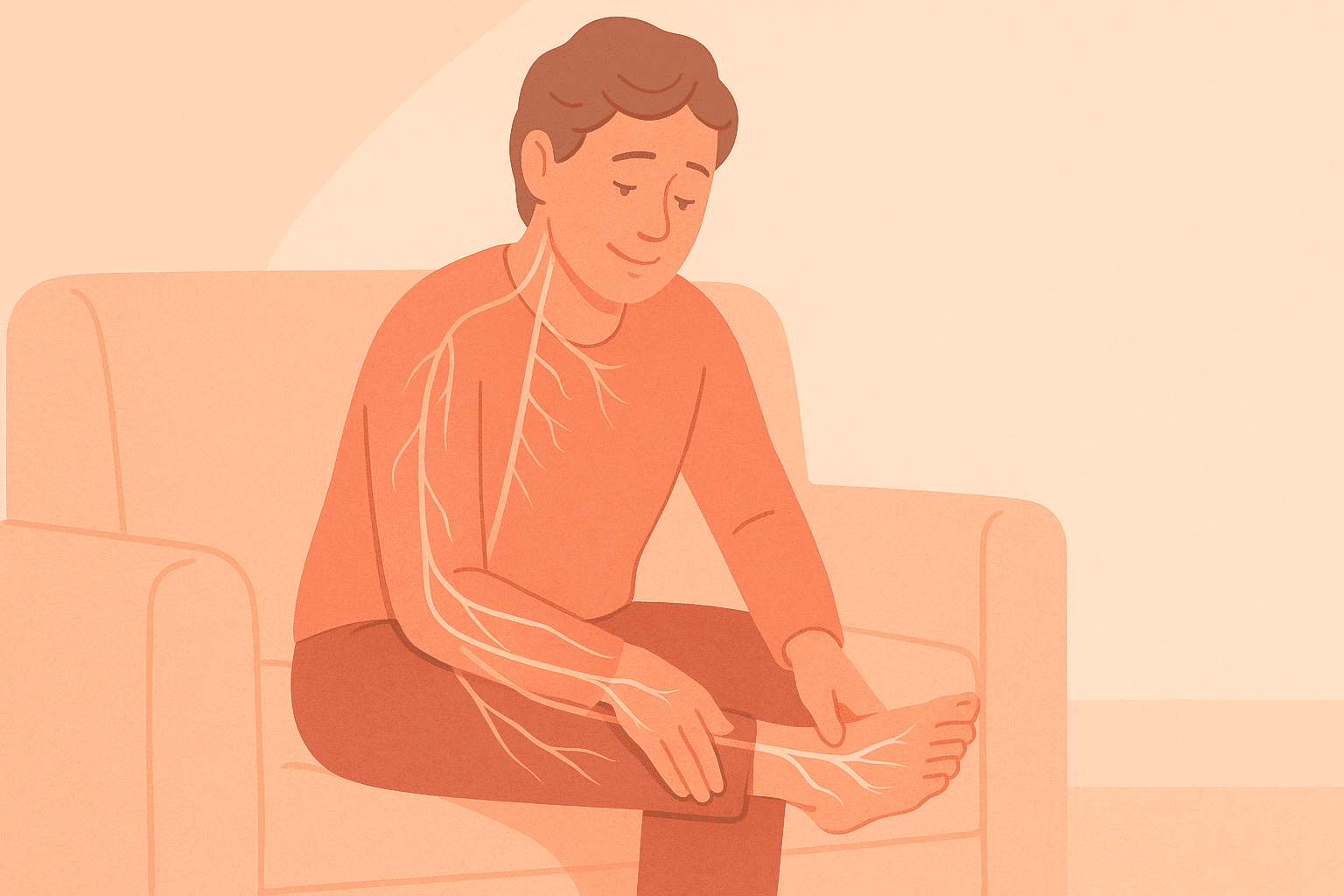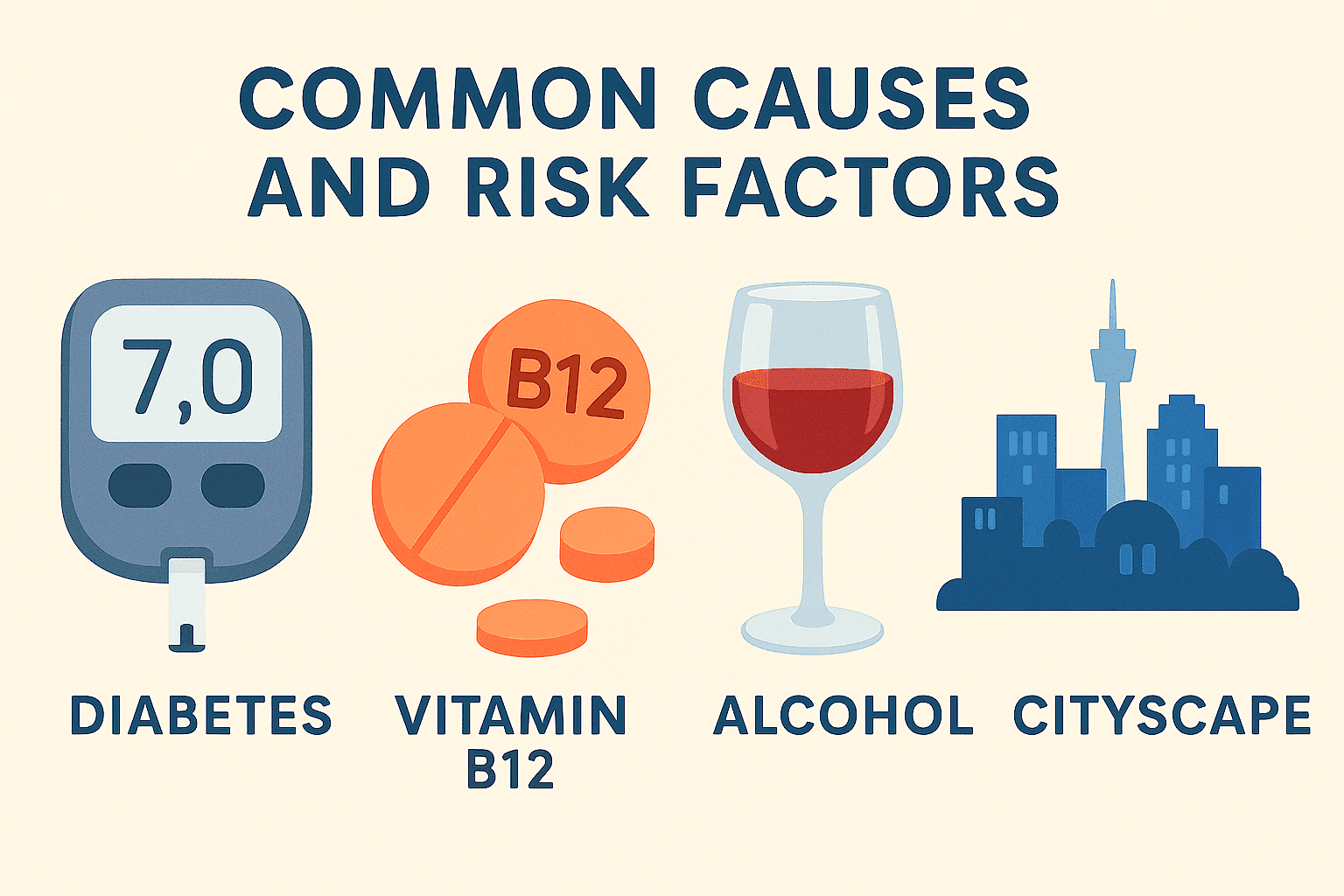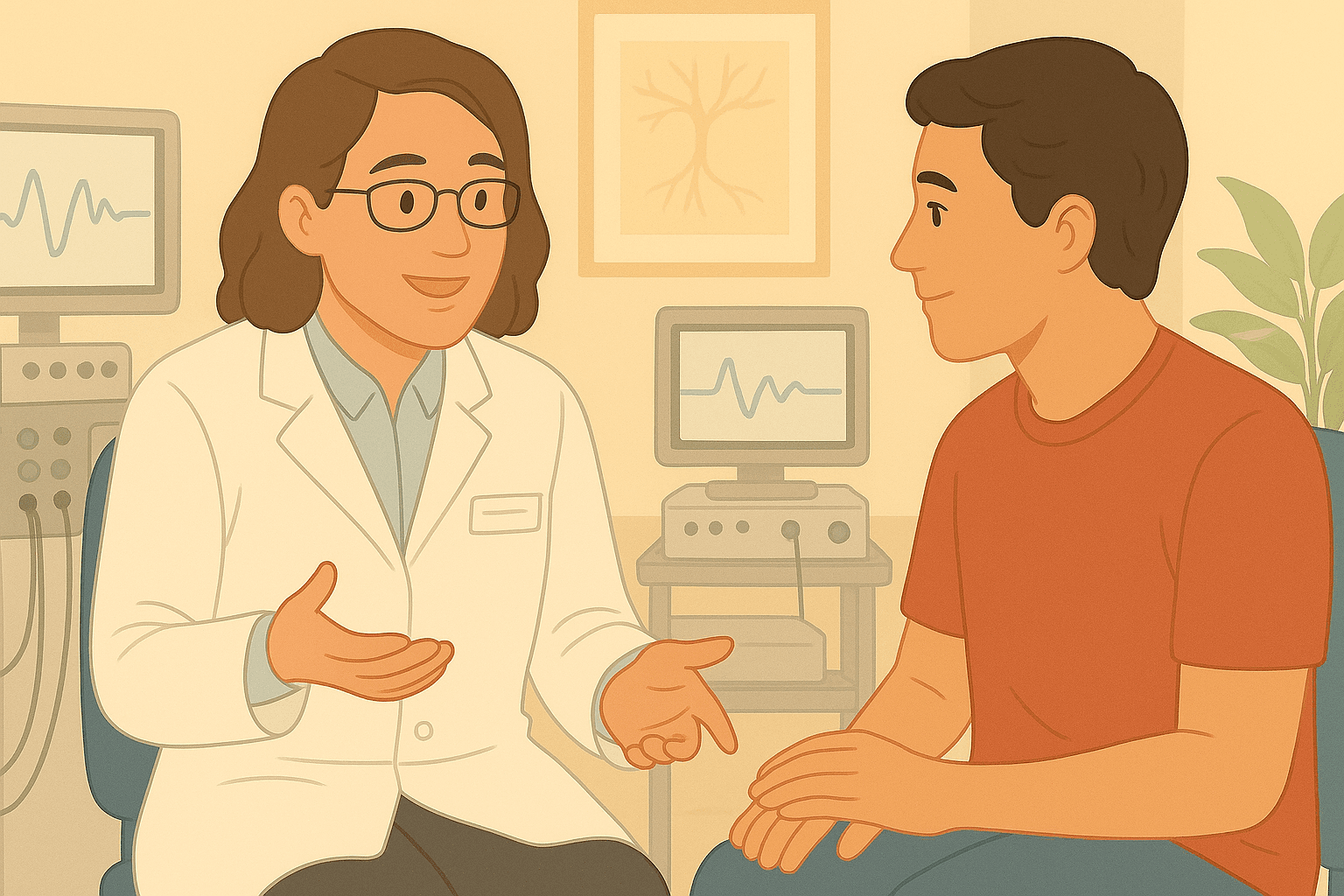Peripheral neuropathy

Overview
Peripheral neuropathy occurs when nerves outside your brain and spinal cord become damaged, causing symptoms like numbness, tingling, or pain—most commonly affecting your hands and feet. Think of your peripheral nerves as electrical cables carrying messages between your brain and the rest of your body. When these "cables" are damaged, the messages don't get through properly.
Understanding Peripheral Neuropathy: Expert Care You Can Trust
If you're experiencing numbness, tingling, or burning pain in your hands or feet, you're not alone. At CURA Medical Specialists, our experienced neurologists Dr. Shadi El-Wahsh and Dr. Henry Vo provide compassionate, expert care for peripheral neuropathy right here in Sydney. We're here to help you understand your condition and find the right treatment path.
What is Peripheral Neuropathy?
Peripheral neuropathy occurs when nerves outside your brain and spinal cord become damaged, causing symptoms like numbness, tingling, or pain—most commonly affecting your hands and feet. Think of your peripheral nerves as electrical cables carrying messages between your brain and the rest of your body. When these "cables" are damaged, the messages don't get through properly.
You're not alone in this journey. Peripheral neuropathy affects approximately 2-8% of the general population, with higher rates among those over 50 years, and with proper diagnosis and treatment, many symptoms can be effectively managed or even improved.
The Most Common Symptoms Include:
Please note: Many peripheral neuropathy symptoms overlap with other neurological disorders affecting the brain and spine, so it often requires a neurologist to make an accurate diagnosis.
- Gradual onset of numbness and tingling in your feet or hands
- Sharp, jabbing, or burning pain
- Extreme sensitivity to touch
- Muscle weakness
- Lack of coordination and falling
- Changes in blood pressure or heart rate
Recognising the Warning Signs Understanding when to seek help
Understanding when to seek help can make a significant difference in your treatment outcomes. Many of our patients at CURA wish they had sought help sooner.
Early Warning Signs:
Peripheral neuropathy most commonly affects the limbs (arms and legs), particularly starting in the hands and feet.
- Tingling or "pins and needles" that doesn't go away
- Gradual numbness starting in your toes or fingertips
- Burning or stabbing pain, especially at night
- Increased sensitivity where light touch feels painful
When to Seek Help Immediately:
- Sudden onset of severe symptoms
- Rapid progression of numbness spreading up your arms or legs
- Severe muscle weakness
- Rapid loss of bowel or bladder function
Don't wait if you're experiencing these symptoms. Early intervention often leads to better outcomes.

Common Causes in Australian Patients
Understanding what might be causing your peripheral neuropathy is the first step toward effective treatment.
Leading Causes We See at CURA:
Diabetes - The most common cause, affecting approximately 1.4 million Australians. High blood sugar levels can damage nerves over time.
Vitamin B12 Deficiency - Particularly common in older Australians and those following certain diets.
Alcohol-Related Neuropathy - Chronic alcohol consumption can directly damage peripheral nerves.
Autoimmune Conditions - Where your immune system mistakenly attacks your own nerves.
Chemotherapy Side Effects - Certain cancer treatments can cause neuropathy.
Inherited Disorders - Some forms of neuropathy run in families.
Sydney-Specific Risk Factors:
- Occupational hazards common in trades and repetitive work
- Urban lifestyle factors that may contribute to diabetes risk
- Nutritional deficiencies related to busy city lifestyles

How We Diagnose Peripheral Neuropathy at CURA
At CURA Medical Specialists, we use a comprehensive approach to accurately diagnose your condition and identify the underlying cause.
Your Initial Consultation:
Our neurologists will spend time understanding your symptoms, medical history, and how neuropathy is affecting your daily life. We believe in listening to our patients—many tell us this is the first time they've felt truly heard about their symptoms.
Advanced Diagnostic Testing:
Nerve Conduction Studies (NCS) - These tests measure how well your nerves carry electrical signals. During the test, small electrodes are placed on your skin, and mild electrical pulses are used to stimulate the nerves. This helps us determine the speed and strength of nerve signals, identifying exactly where and how severely nerves are affected. It's like testing the "wiring" in your body to see where the problem lies.
Electromyography (EMG) - This test examines the electrical activity in your muscles using a thin needle electrode. It helps determine if the problem is with the nerve, muscle, or the connection between them. The test shows us how well your muscles respond to nerve signals.
Comprehensive Blood Tests - We'll check for underlying causes like diabetes, vitamin deficiencies, or autoimmune conditions.
Brain and Spine Imaging - In many instances, imaging of the brain and spine may be necessary to rule out other neurological causes that might be contributing to symptoms we initially attribute to peripheral neuropathy.
Preparing for Your Visit:
- Wear loose, comfortable clothing
- Bring a complete list of medications and supplements
- Prepare a timeline of when your symptoms started and how they've progressed
- Write down questions you'd like to ask
What to expect: Your nerve tests are generally well-tolerated. Most patients describe them as mildly uncomfortable rather than painful, and they typically take 30-60 minutes to complete. For detailed information about preparing for these tests, please review our nerve conduction studies services.
Treatment Options: Your Path to Better Health
Every patient is unique, which is why we develop personalised treatment plans based on your specific condition, symptoms, and lifestyle.
Our Comprehensive Treatment Approach:
Treating Underlying Causes
- Diabetes management and blood sugar optimisation
- Vitamin supplementation for deficiencies
- Management of autoimmune conditions
- Lifestyle modifications to prevent further nerve damage
Pain Management Strategies
- Targeted medications for neuropathic pain
- Nerve block procedures when appropriate
- Non-pharmaceutical approaches including physiotherapy
Rehabilitation and Support
- Physiotherapy to improve strength and balance
- Occupational therapy for daily living adaptations
- Balance training to reduce fall risk
Why Choose CURA Medical Specialists?
Unparalleled Expertise:
- Dr. Shadi El-Wahsh and Dr. Henry Vo bring specialised neurological expertise
- Dr. Grace Swart provides expert neurophysiological studies
- All doctors have dedicated fellowship training in neurophysiology
- Advanced training in the latest diagnostic and treatment techniques
- Recognised leaders in neurological care
Patient-Centred Care:
- Same-day appointments often available for urgent cases
- Comprehensive consultations—we take the time you need
- Clear communication in language you understand
- Excellent review profile on Google and Doctify platforms
Advanced Technology:
- State-of-the-art nerve testing equipment
- Modern diagnostic facilities in our Drummoyne clinic
- Access to the latest treatment options
Convenient Sydney Location:
- Easy access from across Sydney
- Public transport connections
- Ample parking available
- Wheelchair accessible facilities
Frequently Asked Questions
Can peripheral neuropathy be cured? While some forms of neuropathy can be reversed (especially those caused by vitamin deficiencies), many types can be effectively managed to prevent progression and significantly reduce symptoms. Early treatment generally leads to better outcomes.
How long does it take to see improvement? This varies depending on the underlying cause and severity. Some patients notice improvement in pain within weeks of starting treatment, while nerve regeneration can take several months. We'll discuss realistic timelines during your consultation.
Will I need ongoing treatment? Most patients benefit from ongoing monitoring and management. This might include regular check-ups, continued medication, or lifestyle modifications. We'll work with you to develop a sustainable long-term plan.
Is peripheral neuropathy hereditary? Some forms are inherited, while others are acquired due to medical conditions or lifestyle factors. We'll assess your family history as part of our comprehensive evaluation.
Can I still exercise with neuropathy? Absolutely! In fact, appropriate exercise is often beneficial. We'll help you identify safe, effective exercises that can improve your symptoms and overall health.
How much will my treatment cost? For detailed information about consultation fees and costs, please refer to our fees page which you can access in the header of our website. Many of our diagnostic tests and consultations are covered by Medicare, and we accept all major private health insurers.

Take the Next Step Toward Better Health
Don't let peripheral neuropathy control your life. At CURA Medical Specialists, we're here to provide the expert care, advanced diagnostics, and personalised treatment you deserve.
Book Your Consultation Today:
Phone: (02) 7906 8356
Online: [Book through our secure patient portal]
Address: Suite 3.2, 135 Victoria Rd, Drummoyne NSW 2047
What to Expect at Your First Visit:
- Comprehensive consultation (typically 45-60 minutes)
- Detailed neurological examination
- Discussion of diagnostic testing if needed
- Clear explanation of findings and treatment options
- Written summary and next steps
Getting to CURA:
- By car: Ample parking available on-site
- By public transport: Short walk from Drummoyne ferry wharf
- From Sydney CBD: 15 minutes by car or 25 minutes by public transport
At CURA Medical Specialists, we understand that peripheral neuropathy affects every aspect of your life. Our commitment is to provide you with the expertise, compassion, and personalised care you need to reclaim your health and independence. Contact us today to begin your journey toward better neurological health.
Disclaimer: This information is for educational purposes and should not replace professional medical advice. Always consult with a qualified neurologist for diagnosis and treatment of peripheral neuropathy.

Dr. Hugh Stephen Winters
Stroke and Interventional Neurologist, MBChB (Auckland), FRACP (Neurology), CCINR (Neurology)
Reviewed on: 8 June 2025


